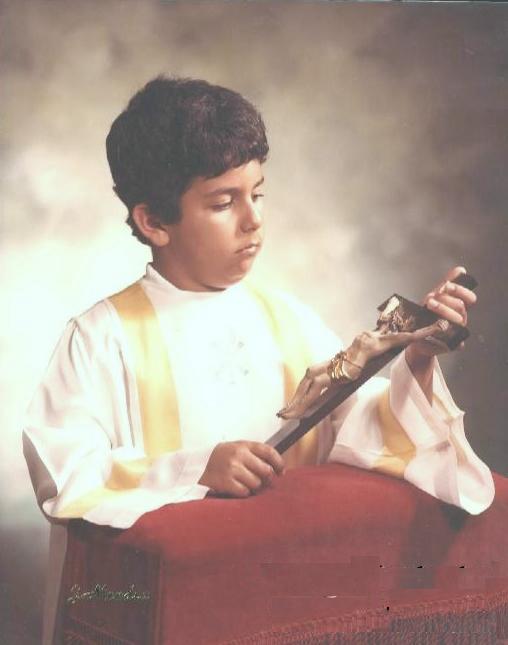
Religion and Violence

Figure 1.--Most religions preech a moral code which proices peace and restrain violence. Jesus notably preached about turning the other cheek. Muslims are fond of mentioing the number of tomes peace occurs in the Koran. Atheists poibt to a long list of historical incidents where religion was responsible for terrible violence. They notably leave out of the argument the terrible crimes committed by secular, especially, athesist states in the 20th century.
|
|
Most religions preech a moral code which promotes peace and restrains violence. A pertinent question is just how does religion restrain violence or is it responsible for violence. Terrible crimes of violence, however, have been committed in the name of religion. Here there is a long historical record. The critics of religion point out the intolerance often associated with religions in history and the violence sometimes prepetrated in the name of religion. Often mentioned are the Crusades, Inquisition, European religious wars (16th century), Christian and Muslim forced conversions, Muslim piracy and enslavement of Christians, Christian enslavement of Muslims, modern Islamic terrorism and many other historical examples. A key factor here is the degree to which a religion is exclusive or dominant. The degree of dominance is often directly proportinate to the use of violence. The question of religion and violence is an important one and there are considerable historical examples in which religion is linked with violence. The critics of religion, however, fall into an all too frequent historical falacy when they connect religion with violence. These critics begin with their conclusion that religion is evil and then collect evidence to substantite their conclusion. They ignore historical crimes that were not founded on religion. And they ignore crimes perpetrated by secular states, in many cases states which strongly advocating aethism. Look at the major crimes of the 20th century (Soviet killing, the NAZI Holocaust, Chinese Communist killing, the genocide of the Kymer Rouge, North Korean killing, ect.). These are all crimes created by 1) secular states either committed to atheism and targeting religious people or 2) states where religious teachings were dismissed or rejected. Using the logic of those criticizing religion, it was the absence of religion that made these secular states so deadly. Logically if religion propagates violence than by the same logic in the 20th century atheism must also be seen as propagating violence. And when measured in body counts, it is the athesist states of the 20th century that have been the great perpetrators of violence in human history. Atheistis are quick to make the charge of violence against religions. Never do they add the violence perpetrated by atheistic states to the argument.
Moral Codes
Most religions preach a moral code which promotes peace and restrains violence. That does not mean that all members of that religion abide by that code or even the religiius authorities, have allways abided by the perscribed moral code.
There are also substantial differences in the moral codes preached by different religions. The codes share many values, but are not identical.
Religion and Historical Violence
A pertinent question is just how does religion restrain violence or is it responsible for violence. Terrible crimes of violence, however, have been committed in the name of religion. Here there is a long historical record. The critics of religion point out the intolerance often associated with religions in history and the violence sometimes prepetrated in the name of religion. Often mentioned are the Crusades, Inquisition, European religious wars (16th century), Christian and Muslim forced conversions, Muslim piracy and enslavement of Christians, Christian enslavement of Muslims, modern Islamic terrorism and many other historical examples. A key factor here is the degree to which a religion is exclusive or dominant. The degree of dominance is often directly proportinate to the use of violence. The question of religion and violence is an important one and there are considerable historical examples in which religion is linked with violence. Most are, however, historical rather than contemporary.
Cause and Effect
The critics of religion, however, fall into an all too frequent historical falacy when they connect religion with violence. These critics begin with their conclusion that religion is evil and then collect evidence to substantite their conclusion.
Secular Violence
They ignore historical crimes that were not founded on religion. And they ignore crimes perpetrated by secular states, in many cases states which strongly advocating aethism. Look at the major crimes of the 20th century (Soviet killing, the NAZI Holocaust, Chinese Communist killing, the genocide of the Kymer Rouge, North Korean killing, ect.). These are all crimes created by 1) secular states either committed to atheism and targeting religious people or 2) states where religious teachings were dismissed or rejected. Using the logic of those criticizing religion, it was the absence of religion that made these secular states so deadly. Logically if religion propagates violence than by the same logic in the 20th century atheism must also be seen as propagating violence. And when measured in body counts, it is the athesist states of the 20th century that have been the great perpetrators of violence in human history. Atheistis are quick to make the charge of violence against religions. Never do they add the violence perpetrated by atheistic states to the argument.
Religion as a Moderating Influence
Sources
HBC

Navigate the Boys' Historical Clothing Web Site:
[Return to the Main religious page]
[Introduction]
[Activities]
[Art]
[Biographies]
[Chronology]
[Clothing styles]
[Countries]
[Photography]
[Bibliographies]
[Contributions]
[FAQs]
[Glossary]
[Images]
[Links]
[Registration]
[Tools]
[Boys' Clothing Home]
Created: 1:22 AM 12/5/2008
Last updated: 11:11 AM 1/1/2012



